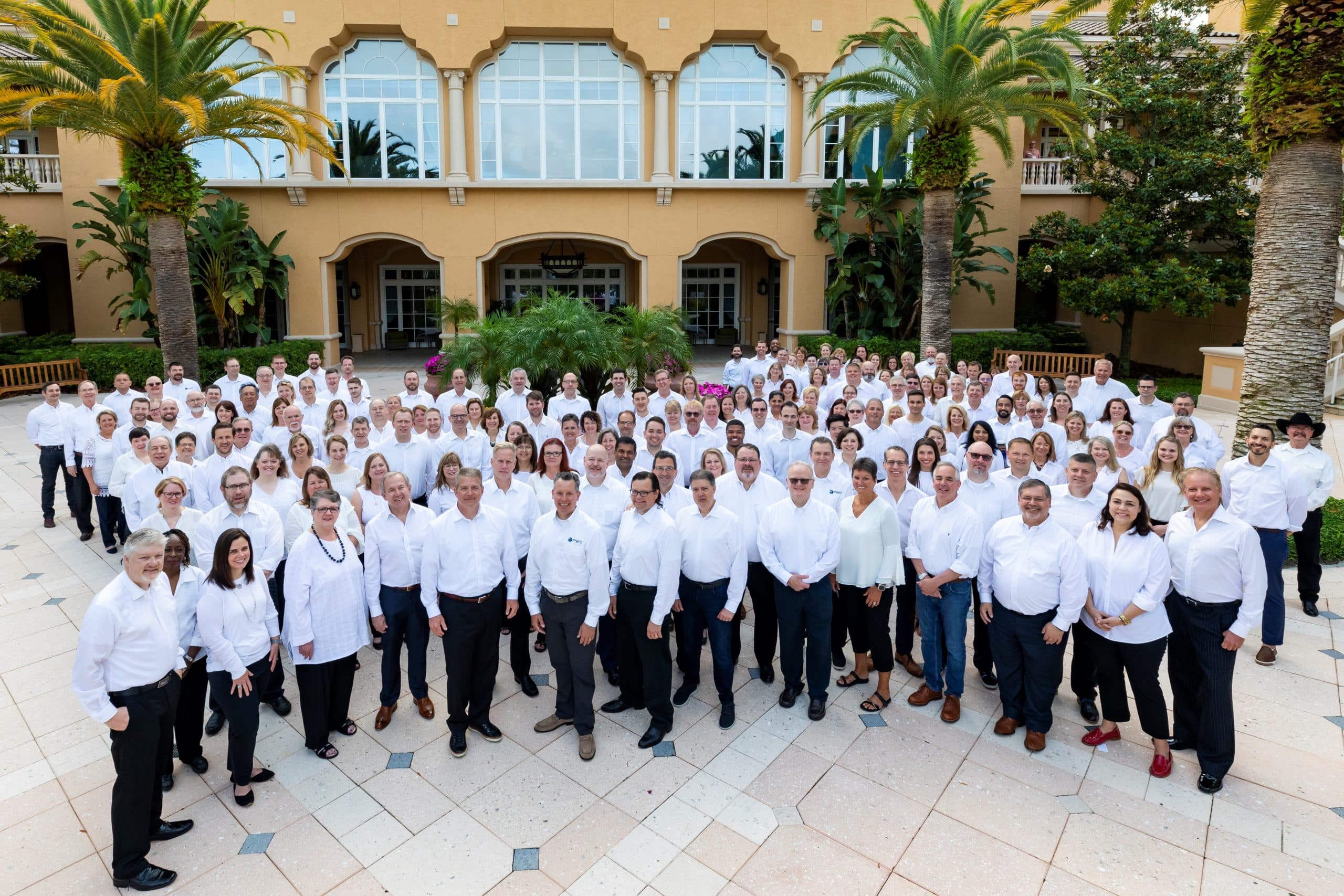I am regrettably familiar with toxic culture, politics, and artificial barriers to success in the workplace. While being in that type of environment, despite personally achieving success, I found myself showing up to work every day feeling like a loser. So, along with my brother Pete, my wife Maria, and our close friend Todd Hollowell, I set out to create a company with the best talent and the best culture. In other words, a “Company of Winners.”
The four of us founded Impact Advisors – a leading healthcare management consulting firm committed to solving the industry’s emerging and evolving challenges – in 2007. In that time, we have become the most awarded consulting firm in healthcare, winning numerous consecutive industry-specific awards for the quality of our services (such as being recognized as “Best in KLAS” for the last 17 years) and for the strength of our culture (including being designated a “Best Place to Work” by Modern Healthcare for 14 years). What started with a few laptops and a kitchen table is now a $220 million company.

I’ll tell you right up front: in the world of professional services, building a Company of Winners is pretty simple. First off, you need to hire and develop talented folks who also live and breathe your firm’s values. Secondly, you need to embrace the concept of servant leadership. Lastly, you need to genuinely care about your staff.
Simple doesn’t mean easy though. Building a Company of Winners means that you – and the people you surround yourself with – need to innately possess and actively practice empathy. It takes an unwavering commitment to your core beliefs and a significant investment of time, resources, and money. But I can categorically tell you, the four of us wouldn’t have done things any other way.
Introduction
World class talent and a great workplace culture. I think any CEO would agree those two elements are a solid recipe for any company’s long-term success. But talent alone doesn’t guarantee good culture.
There have been numerous studies from extremely reputable sources over the years about the benefits of a strong workplace culture. There have even been many efforts to quantify the specific financial impact that good culture can have on a company. The numbers vary, but the findings always echo the same theme: at firms that make a concerted effort to ensure their staff is supported and happy, the employees are more engaged. Engaged employees are more productive and stay with that company longer.
My goal is not to cover those studies here. The trend is already well documented – and the data is unquestionably compelling. There is a catch though. While I can tell you firsthand that great culture does indeed result in tangible benefits, those benefits cannot be your sole motivation for implementing cultural change. Those benefits cannot be what influences your decisions about how to best support your staff. That’s not how culture works. The benefits of a great workplace culture are certainly real, but they are ultimately just a by-product of your commitment to your employees and how much you genuinely care about them.
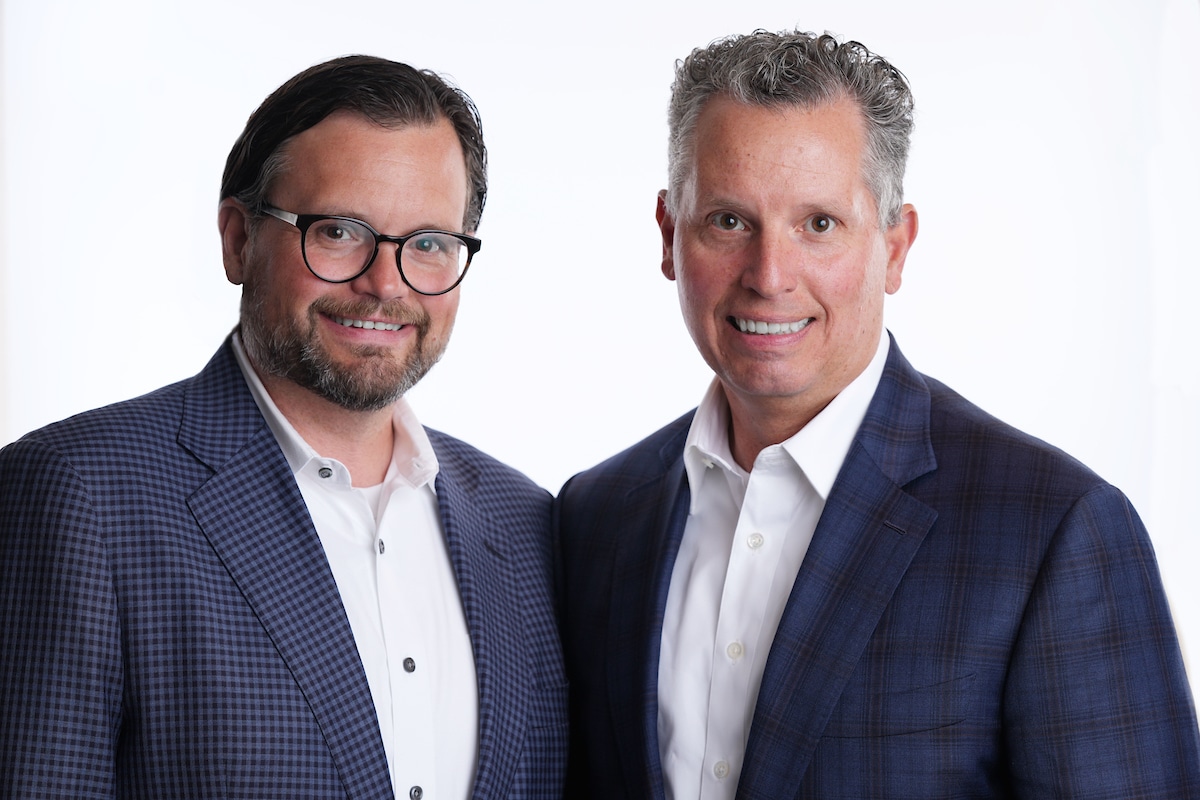
Since Pete, Maria, Todd and I founded Impact Advisors in 2007, we’ve won countless awards. We’ve been regularly recognized by our clients (for the quality of our services) and by our employees (for our culture). I am deeply proud of each and every award we’ve earned, but winning awards was never our goal. That is certainly a great perk, but we have never made a single decision with awards in mind.
As I’ll discuss in this article, we do everything in our power to ensure our employees are supported, happy, and in the best position possible to achieve professional and personal success. We hire the most talented people in the industry who actively demonstrate our core values. The actions we have taken over the years to foster a strong workplace culture for those folks haven’t been because we were looking for a specific percentage increase in productivity from our staff or because we wanted to lower attrition by a certain amount. We’ve invested in our associates and in our culture because that is the type of firm we wanted to be a part of.
This is the story of how my brother and I — along with my wife Maria Smith and our
close friend Todd Hollowell — built Impact Advisors, a “Company of Winners.
The Winner Epiphany
I’ve only worked for two companies in my life. The first one I joined right after I graduated college; the second one I founded 16 years later.
My first employer was a healthcare IT services firm. My older brother Pete – one of the single biggest influences on my life – worked there too. I learned so much at that firm. It was still a small company when I was hired, so we had to be extremely agile and nimble, with everyone wearing all the proverbial “hats” imaginable. I thrived in that environment. I became one of the youngest vice presidents in the company’s history and was one of only two people to win Employee of the Year twice. More importantly though, I knew I was doing meaningful work that was resulting in tangible value for my clients. I had a strong working relationship with my colleagues and mentors, and all of the tools that I needed to be successful were right there at my disposal.
As the company grew, things started to change. The strategy of the firm became increasingly unfocused; the services too broad and diluted. A new executive team was brought in, and it was clear that making the company an attractive acquisition target was a higher priority than delivering quality services to our clients. Artificial barriers to success were manifesting everywhere. I suddenly felt like my ability to sell meaningful services or help my clients solve a problem was solely based on whether the margins were high enough.
The culture that I had come to love – and the culture that separated us from our competitors – began to rapidly deteriorate as well. I will never forget the first Town Hall call that our new CEO had with me and the other vice presidents. He told us that, effective immediately, he was freezing salaries for the foreseeable future because we were overpaid and ineffective. While I understood there were legitimate business reasons behind the decision given the company’s financial situation at the time, the manner by which that decision was communicated was bafflingly tone-deaf. There were just so many better options to get that message across in a people-friendly way – options that could have even rallied or inspired us.
As the years passed, my feeling of malaise grew. It wasn’t something I could articulate or put my finger on at the time, but it was real. Even my family and friends noticed a change in my naturally optimistic demeanor.
The epiphany for me finally happened in a conference room in Nashville during a leadership retreat in 2006. The company had recently – and somewhat impulsively – decided to purchase an offshore software development firm after one of the executives read “The World Is Flat.” Management was pushing us to find a way to outsource one of the firm’s core services – the implementation of hospital and health system electronic health record (EHR) systems – offshore. At the time, this was an outlandish idea at best. We patiently explained that our EHR implementation services were extremely labor intensive and required face-to-face contact with users of the system, but management wouldn’t listen. They had decided we were going to be an offshore firm, and by virtue of that, they expected us to sell services we knew our clients didn’t want and weren’t ready to receive.
It was a completely deflating conversation that drained all the energy and enthusiasm out of the room. I was in charge of the company’s Midwest region at the time. The region was doing really well, and it actually represented the largest and most profitable part of the firm. By any conventional measure I was achieving professional success, but sitting there getting berated for not selling more services that I knew my clients didn’t want, it dawned on me: I felt like a loser.
It was then that I decided enough was enough. As soon as my brother Pete and I left and headed to the airport, we started planning. We decided we were going to build the best consulting firm on the planet. We would be an obsessively customer-focused company, working directly in the best interests of our clients and achieving exemplary results. We would attract and develop the best consultants in the industry. We would ensure that our employees had access to all the tools they needed to thrive, without any artificial obstacles preventing them from achieving success. We would have a culture where our firm celebrated our accomplishments – and our employees celebrated each other.
Simply put, we were done feeling like losers.
We were going to build a “Company of Winners.”
What Do I Mean by a "Winner"?
Before I go over how we built – and grew – a “Company of Winners,” I think it is important to spend a moment on the word “Winner” itself, since that term is so foundational to the very DNA of Impact Advisors. In fact, it dates back to the very first people we turned to when we founded our company.
The word “Winner” has been firmly ingrained in society’s vernacular for many centuries. If you approached random people on the street and asked them to describe what a “Winner” is, almost all of them would probably tell you that a “Winner” is someone who is talented, highly skilled at their respective craft. You would undoubtedly also hear that “Winners” are passionate and that they work hard; that they strive for – and achieve – excellence in whatever they do.
I wholeheartedly agree with those characterizations, but for me, the term “Winner” goes much further. Winners are authentic and genuine. Winners do the right thing. Winners are resilient; they always find a way to get the job done and deliver value. Perhaps most importantly of all, Winners innately possess – and actively practice – empathy. Regardless of whether they are talking to a colleague, a client, or a total stranger, Winners make it a priority to put themselves in the other person’s position. Winners are aware of how their words and actions affect other people.
Hiring talented people is absolutely critical to the success of any company, and I am proud to say that Impact Advisors has the most talented and skilled folks that you will find anywhere – in any firm or in any industry. When I talk about a “Company of Winners” though, it is about more than only talent. These are people you would want to have dinner with; people who you would trust implicitly regardless of the circumstances. These are people who live and breathe our firm’s core values every day.

It is hard to overstate how important the concept of hiring “Winners” is to our firm. When my brother and I decided we were going to create a company, the first thing we did was turn to two of the most talented “Winners” I have ever met in my life: my wife Maria Smith, who served as our CFO, and our close friend Todd Hollowell, who is our COO.
While Pete and I were out trying to grow the business (hiring, selling, and delivering work), Maria and Todd were the ones making sure we were able to stay in business. They ensured all of the critical operational work was getting done (e.g., paying our staff on time, organizing and filing our taxes, staying compliant with all regulatory requirements) and that we were in a healthy financial position. Remember, none of us had ever founded a company before.
Pete and I are immensely fortunate we had family and friends – quite literally – who we trusted completely and unconditionally to build out the core of what Impact Advisors is today. If it wasn’t for Maria and Todd – Impact Advisors’ very first “Winners” – Pete and I almost certainly would never have had the courage (or frankly, even the ability) to step out and be successful.
Building a "Company of Winners"
A lot of people think that once you become the boss, you instantly get to tell everyone what to do; that you can just make proclamations and you suddenly don’t have to worry about what people think or whether they are happy. And that is probably the case for many CEOs out there. I just would never want to work for those companies – and I’m pretty sure none of the Winners at Impact Advisors would either.
The reality is that the exact opposite is true. When you become the boss, you actually need to spend more time than ever caring what people think – and focusing even harder to make sure folks are happy and that they feel supported. Your employees need to know you genuinely care.
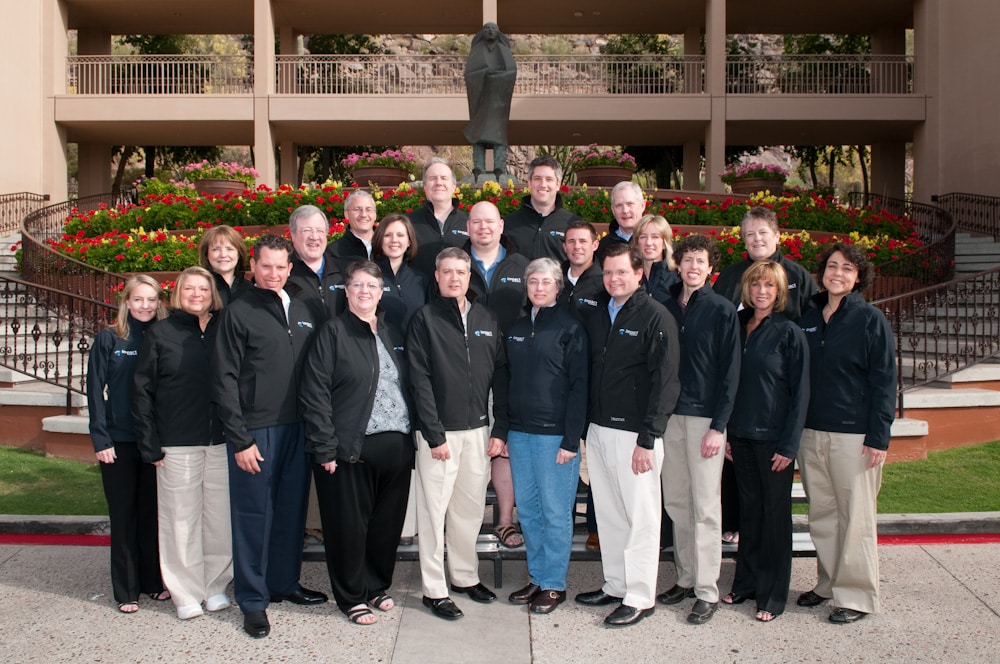
One of my mentors told me a long time ago that “there is no limit to what you can accomplish in life if you don’t care who gets the credit.” That quote still resonates with me to this day – and is a good way to characterize our management philosophy. Impact Advisors is a professional services company. People are our only asset; our only “product.” Our firm is quite literally only as good as the hard work of our Winners. That is why Pete, Maria, Todd and I have always felt the most important part of our job as servant leaders is to support our Winners and ensure they have all the tools necessary to succeed.
We go out of our way to belabor this point internally. For a long time, any org chart that we ever published was always “upside down”, with the senior leadership team at the bottom. We very deliberately did this to drive home the message that we are in service of the company and the Winners who work here.
Overall, the three key tenets that we’ve adhered to in building the firm – hiring and developing Winners, servant leadership, and genuine caring – are central components to an employee’s entire journey with our company.
#1: Recruiting and Onboarding a Winner (a.k.a. Controlling the “Moments of Truth”)
Any time I think about recruiting and onboarding a Winner, I’m reminded of a book I read decades ago called “Moments of Truth.” It was written by the President and CEO of Scandinavian Airlines (Jan Carlzon) in the mid-1980s, but the concept is just as important today. The premise is that the initial interactions between a company’s front-line employees and a customer – no matter how brief – are “Moments of Truth” because those interactions can deeply ingrain a perception about the company in the customer’s mind.
Recruiting and onboarding are absolutely “Moments of Truth” for our firm, with our recruiters and onboarding staff being the “frontline employees,” and the new Winner being the “customer.”
Recruiting
Controlling the “Moment of Truth” during the recruiting process is particularly crucial for us because we are extremely selective with our hiring. We have to be. As a services firm, people are our only asset. In fact, in 2023, we hired just 2.3% of all applicants.
We specifically hire on three attributes:
1) Aptitude. Can the person do the job, as demonstrated by their experience, skill set, and level of success?
2) Work ethic. Everyone at our company works extremely hard to make a positive impact for our clients, and we expect any new Winner to do the same.
3) Attitude. This one is the hardest to gauge and likely the most important of all three. We’ve all worked with incredibly talented people who are difficult to get along with – but that is not our model. We have a very strict “no jerks” rule. The real question comes down to “is this a person you would like to have dinner with?” If the answer is “no,” then they also aren’t a person we would like to have working at Impact Advisors.
We need our recruiters to be able to not only identify potential Winners who meet the criteria above, but also sell any qualified candidates on the opportunity of joining our firm. That is why we ensure all our recruiters are role models who actively practice our firm’s core values. Simply put, the reason they continue to be so successful at attracting the right people to Impact Advisors is because they are those people.
Onboarding
At many companies, the onboarding process is fairly transactional: sign your offer letter, fill out your tax forms, attend a quick orientation webinar, get your laptop set up. Maybe someone sends out a welcome email introducing you to the firm. I’ll be honest: we started that way too – until we figured out that successfully building a “Company of Winners” requires a much more deliberate and immersive approach to onboarding.
The realization for us happened about five years after we founded Impact Advisors, when we were in a pivotal period of growth as a firm. That rapid growth meant that new hires were getting placed on projects without any orientation at all – and in looking back, we had some difficult clients and even some difficult associates at that time. The project culture was becoming the whole world for new associates, and they just assumed the whole firm was exactly the same. In short, we weren’t doing a good job controlling the “Moment of Truth.”
As soon as we recognized the problem, we implemented changes. We now treat a Winner’s entire first year with us as their “onboarding.” There is a “Welcome New Winner” map that each new hire receives as soon as they join the firm that outlines all the key touchpoints over the course of that first year. We provide a series of orientation sessions for new Winners in their first few weeks alone to connect them with all the different resources we offer.
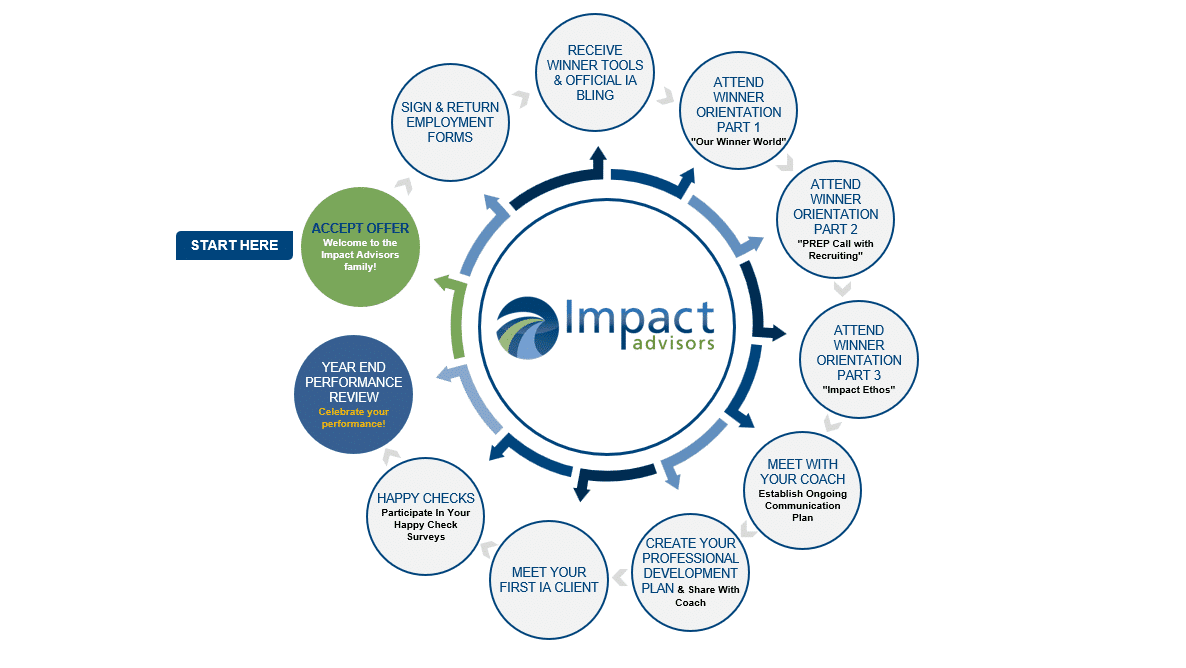
After a new Winner has been with us for 90 days, we conduct a “Happy Check” to see how things are going – and to determine if there is anything we can do to better support them in their journey.
Whenever we bring a new Winner onboard, we also go out of our way to ensure folks in our firm get to know that new hire as a person. For example, we have their coach send out a welcome email to the entire company. Unlike most firms though, this “welcome” message not only covers the new Winner’s professional experience, it also – and more importantly – talks about their life outside of work. I love seeing the photos of new Winners’ families and pets, hearing about their hobbies and passions, and even finding out their favorite professional sports teams. It showcases the real person rather than just the resume.
Impact Advisors’ “Happy Check” Questions
- On a scale of 1 to 10 with 10 being the happiest rating, how happy are you that you joined the Impact Advisors family?
- On a scale of 1 to 10 with 10 being the happiest rating, how happy are you with the work that’s been assigned to you since joining us?
- On a scale of 1 to 10 with 10 being the happiest rating, how happy are you with your coach assignment? Are you getting the support and guidance you need?
- What has been your happiest moment since joining our Impact Advisors family?
- Is there any additional feedback you would like to provide?
#2: Developing a Winner
Ideally, everyone wants their career to trend perfectly “up and to the right” – but that is obviously never what ends up happening. No matter how successful an individual is, there will always be ups and downs. It is ultimately the responsibility of each person to manage those ups and downs, advocate for themselves, and take ownership over their own career. As I remind my adult children all the time, “no one cares more about your career than you.” Winners know this better than anyone. In fact, that is one of the traits that makes someone a Winner.
Although Winners are by nature the type of people who take accountability and ownership of their career, it is still very much incumbent on us as a “Company of Winners” to give them the structure and support they need to thrive. These are extremely motivated, hard-working, and highly engaged people. Our goal is to ensure that there are no artificial barriers standing in their way (political, bureaucratic, or otherwise).
Our Winners have many different mentors that they can turn to, whether their project manager, their service line leader, the vice presidents, or any of us on the senior leadership team. Each Winner also has a dedicated “coach.” This isn’t someone who just takes care of that Winner’s annual review; this is a person who continually supports the Winner with whatever guidance they need to advance their career. The relationship between a coach and coachee is an important one, and we treat it as such. I’m proud that we’ve fostered a culture where there is no stigma when someone switches coaches. Because there really shouldn’t be. Coaching can – and should – be fluid. As Winners’ careers change or as their needs change, they may just benefit from a different person’s perspective or a new communication style. The key is doing what is best to ensure each individual Winner is positioned to succeed.
Our approach to developing a Winner also goes far beyond traditional “career planning.” We also do our best to account for what our Winners are trying to accomplish as people. A Winner has a life outside of work – and that life outside of work is very important to their ability to do work inside the firm. We have always made sure to give everyone at Impact Advisors the opportunity to do charity work, or even just to take whatever time off they need when their pets die. It is important to take a holistic view of the individual.
Making the Difficult Decisions
It’s easy to say “if you want a great rock band then just hire rock stars” – but that is obviously a massive oversimplification. The art of developing a Winner is not always that perfectly cut and dried. For example, our annual reviews are centered around a Winner’s performance against our six core values (i.e., Integrity, Motivation, Passionate, Agile, Caring, and Talented). However, what is the best course of action if someone doesn’t actively demonstrate each and every one of those traits? What happens if a person ends up struggling in the role for which they were hired?
The reality is that even in a “Company of Winners” there can still be difficult decisions that need to be made from time to time in terms of having to let folks go. To be clear, I don’t mean situations where we need to terminate someone because they turn out to be a complete jerk or because we find out they are a person who lacks any integrity. Those are actually very easy decisions, and we make them without hesitation or remorse.
Instead, I’m referring to circumstances where someone might be a little passive in terms of how they approach their career, or when a person may be struggling to communicate effectively with a certain client. The good news is that when you hire on the attributes of aptitude, work ethic, and attitude, most professional development issues are coachable – because the people are coachable.

Good coaching can’t solve every challenge that may come up when trying to develop a Winner though. Sometimes new associates will struggle to achieve the expected results for the specific position for which they were hired. It might just be a case of someone having the wrong seat on the bus: good person, good skill set, but in the wrong role. Sometimes that person is willing to take a different (or even lesser) role and things work out, but at the end of the day, if you don’t have the right role for someone to play – and you can’t coach them into a role that is meaningful for both them and the firm – then you have to make a difficult decision to let the person go.
Ultimately most of the difficult decisions we need to make in terms of having to let someone go are all for the best. For the firm and for that person. If one of our Winners is making the most of the support structure we have in place – and getting the right coaching – and they still aren’t having success, then it might just be a case of differing styles or mismatched skills. These things happen and it isn’t anyone’s fault. We don’t want anyone to come to work every day feeling like a loser. I’ve been there myself. Everyone deserves to feel like they are in an environment where they can be successful.
Making the Easy Decisions
Although there can be difficult decisions at times when developing a Winner, those shouldn’t overshadow the very easy – and very important – decisions that also need to be made in order to achieve success. For example, promotions are an easy decision. Our company is truly a meritocracy; no one has to retire in order for someone to get promoted here. As a professional services firm, we admittedly have an advantage compared to other industries (and other types of companies) which are traditionally much more hierarchical. But I think it is pretty telling that even among other consulting firms, promotions are not always viewed as an easy decision due to internal politics or some other artificial barrier that has just become an accepted part of the culture there.
Another easy decision is helping our Winners grow by exposing them to different types of opportunities. However, much like promotions, that doesn’t necessarily make this a common decision at other firms. It can hurt in the short term to move someone from a situation where they are thriving to a different type of project that will help them grow a new set of skills. The client often won’t like it and may push back; no one wants to lose someone who has been wildly successful in a very specific role for a few years. We work through those transition issues with our clients though since we don’t want any Winners to leave because they feel blocked or pigeonholed, and having more well-rounded people is obviously in the best interest of the firm

Another reason that exposing folks to new opportunities is not always a common decision at other firms is because the employee may push back. Spending too long in the exact same role can sometimes lead to complacency. A person will become so good at the specific set of tasks they are responsible for that it feels uncomfortable to take on something new. We’ve seen it at our company too. There have been many times when we’ve seen so much talent in a Winner – but unlocking that talent required us to really push them into assuming a bigger role or taking on a completely different type of project.
#3: Creating a Destination for Winners
I’ve never liked the term “employee retention.” That sounds like the mindset of someone who is just trying not to lose. Since the day Pete, Maria, Todd and I founded Impact Advisors, our goal has been to make our firm a destination for Winners, a place with the greatest culture where the best and brightest want to spend their entire career.
I think there can be a tendency among executives to overthink culture and make it harder than it needs to be. To me, achieving a great workplace culture is actually pretty straightforward. It all comes down to genuine caring – and the key word is “genuine.” Employees – especially Winners – can immediately tell if their company’s executives are just going through the motions, or if a “culture building” initiative is that in name only. The reality is that if you don’t genuinely care about your employees, your culture will suffer significantly – and there is no shortcut or gimmick that is going to be able to fix the problem.
We actively show our Winners how much we care – and how we are sincerely invested in them as people – a number of different ways. Here are just a few examples:
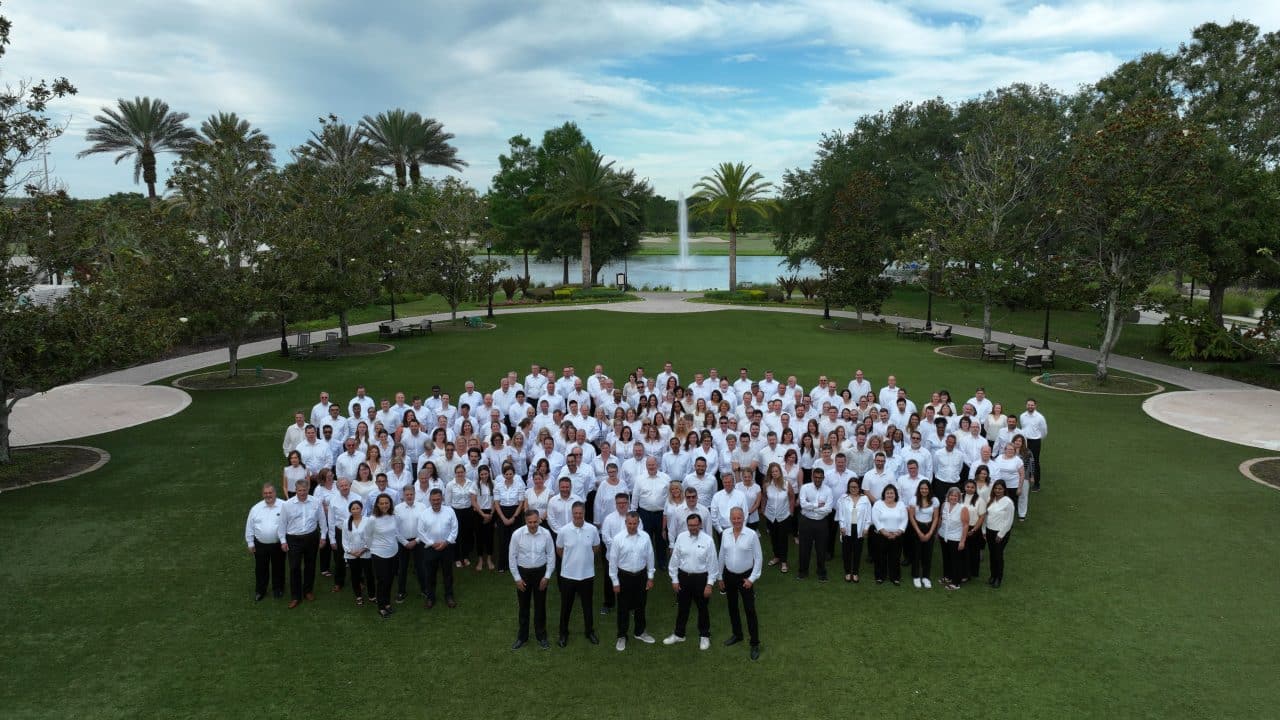
1. Every year we bring everyone together for an in-person celebration called “Impact Palooza.” We use this event to celebrate our Winners and everything we’ve accomplished as a firm over the previous 12 months. It is an invaluable opportunity for our Winners to spend time face-to-face with each other and bond in unique settings, whether on the golf course, at the spa, or over dinner when we host our annual awards ceremony.
We’ve hosted Impact Palooza every year since the firm’s inception (with the only exception being during the pandemic). What started as 15 of us in a conference room in Chicago has grown to more than 317 Winners convening together for a two-and-a-half-day celebration at the Ritz Carlton in Orlando this past spring. Given the size of the event, I’ve had other executives ask me how I determine the “value” of continuing our Impact Palooza celebration every year. My answer is that it just feels right.
On one hand, yes, it is a significant financial investment. There is the cost of everyone’s airfare, hotel room, food and beverage, and entertainment – plus the lost productivity from the entire firm spending almost three days away from client projects. At the same time though, I really believe that so much of what happens every year at Impact Palooza is priceless: the chance to connect with Winners in person, or even just being able to watch our Winners bond with each other in new ways. The energy everyone feels coming out of Palooza every year is truly special.
2. We have a full time “Happyologist.” We’ve always treated our Winners like family. Since the very beginning, anytime my brother or I heard that someone had a family member in the hospital we would send flowers; if someone brought a new child into the world, we’d send an Impact Advisors onesie. As we continued to sell more work and hire more people though, there just wasn’t enough time to keep up. Enter our Happyologist: Michael Nutter, a full-time Winner we hired a few years into the firm’s inception to be exclusively focused on the happiness and well-being of our employees.
I originally envisioned a Happyologist as more of an administrative role for someone right out of college – but that all changed the moment I met Michael. He had almost 30 years of experience in the healthcare industry, working with people at all levels and inspiring them to be their best. He came into the interview with such a clear vision and perspective. Most importantly though, it was clear that Michael was a person who was the living embodiment of “genuine caring.” We brought him in at the leadership level and he’s now a vice president.
Having a completely unbillable person who wasn’t focused on hiring people or getting invoices out the door was a pretty big expense for us at the time, especially given our size. But Pete, Maria, Todd and I knew that if we wanted to continue to be successful with a business where the only product is people while also continuing to grow, then we had to get serious about formalizing our culture building.
I can unequivocally say that hiring a full-time Happyologist has been one of the best decisions our firm has ever made. Michael led the effort to reshape and elevate our firm’s mission, vision, core values, and guiding principles – and he reinforces each of those every day through his amazing work.
Our Guiding Principles
Maintain passion for our work, our results, and our firm.
Preserve our culture of caring and collaboration and our commitment to quality.
Retain and develop associates with integrity and talent.
Sustain a fun and positive environment where our associates thrive.
Remain agile, independent, and unencumbered by external influences.
3. We regularly solicit – and act on – feedback from our Winners. I think a key part of creating a destination for Winners is learning from other like-minded firms. My brother and I were at a Modern Healthcare’s “Best Places to Work” awards ceremony (which is one of the most prestigious awards in our industry), and one of the winning firms talked about how they conduct “stay” interviews rather than “exit” interviews. In other words, figure out why associates like working someplace and also catch problems early. We thought that was a fantastic idea and we implemented it immediately.
We call our “stay” interviews the “VIP” – or “Value Interview Process” – and we make sure to get input from every Winner in the firm at least once a year. Just as importantly, we take the time to both review and act on all of that feedback. Lighter laptops, coaching changes, and new health plan benefits were all direct results of the VIP.
Impact Advisors’ “Value Interview Process" Questions
- If you could choose only ONE word to describe Impact Advisors, what word would you choose?
- On a scale of 1 to 10 with 10 being the happiest rating, how happy are you with Impact Advisors as a workplace, based on your collective experiences since joining the firm?
- On a scale of 1 to 10 with 10 being the happiest rating, how happy are you with your current <or> most recent client/work assignment?
- On a scale of 1 to 10 with 10 being the happiest rating, how happy are you with your coach? Are you getting the support and guidance you need?
- On a scale of 1 to 10 with 10 being the happiest rating, how happy are you with accomplishing your professional development goals over the past year?
- On a scale of 1 to 10 with 10 being the happiest rating, how happy are you with your work-life balance?
- Are there fellow Winners you would like to recognize as those who are always there for you, always advocating for you <or> always available to support you at Impact Advisors?
- Is there anything we could do to better support you in your daily work?
- Is there anything we could do to make Impact Advisors a better firm in general?
- Over the last 2 to 3 months, what has been your most rewarding <or> happiest moment?
4. We actively encourage our Winners to recognize – and celebrate – each other’s accomplishments. We make it a point to borrow great ideas from everywhere. When my kids were in elementary school, the students could be recognized with what were called “Caught Doing Something Nice Awards.” It was just a small piece of paper with a gold star, but what made it so special was that anyone at the school – teacher, staff member, or fellow student – could fill one out to honor someone publicly. I will never forget how absolutely thrilled my son was anytime he would get one. That little certificate saying “Ben Smith was caught being kind to a classmate at lunch” would brighten his entire day. I thought that was such a simple and effective way of helping someone feel recognized and appreciated by their peers – and if it could work for elementary school students, then it certainly could work for our Company of Winners.
And with that, our “High Impact Award” (HIA) program was born. Anyone in our company can recognize one of their fellow Winners with a gift worth up to $50 (which is paid for by the firm). It could be something as big as celebrating the successful completion of a year-long client project, or a way to just say “thank you” to a colleague who helped you through a difficult meeting. No approvals are necessary. The only requirement is the person awarding the HIA has to send a firmwide email recognizing the Winner who they are honoring. Seeing the initial email go out is great, but the outpouring of love and thanks that always ensues is truly special. I’m proud to say that our Winners have recognized each other with a staggering 3,775 HIAs since 2012, including 897 alone in 2023.
The Bottom Line
Successfully building a “Company of Winners” is ultimately pretty simple. You need to hire highly talented people who live and breathe your firm’s core values, you have to embrace the concept of servant leadership, and most importantly, you need to genuinely care about the people who work for you. Simple doesn’t mean easy though. You need to be motivated by the right reasons. You have to be willing to invest the time and money. And perhaps above all else, you – and the people who you decide to surround yourself with – must innately possess and actively practice genuine empathy

